

Most ebook files are in PDF format, so you can easily read them using various software such as Foxit Reader or directly on the Google Chrome browser.
Some ebook files are released by publishers in other formats such as .awz, .mobi, .epub, .fb2, etc. You may need to install specific software to read these formats on mobile/PC, such as Calibre.
Please read the tutorial at this link: https://ebookbell.com/faq
We offer FREE conversion to the popular formats you request; however, this may take some time. Therefore, right after payment, please email us, and we will try to provide the service as quickly as possible.
For some exceptional file formats or broken links (if any), please refrain from opening any disputes. Instead, email us first, and we will try to assist within a maximum of 6 hours.
EbookBell Team

4.0
6 reviewsRadiation-thermal cracking of oil feedstock has the potential to offer a solution to many of the challenges the oil industry is facing. Radiation-induced chain cracking reactions in hydrocarbons at lowered temperatures initiated the development of improved technological approaches, combining the advantages of radiation-thermal cracking and low-temperature feedstock processing. However, researchers still face obstacles in the practical application of theory and experimental data, and the literature presents contradictions that need to be sorted out for further development of this technology.
Petroleum Radiation Processing fills an information gap, providing systematic descriptions of the fundamentals of radiation-induced cracking reactions in hydrocarbons. It analyzes the basic experiments that have brought about the rapid development of radiation technology for petroleum radiation processing during the last decades. The book provides a detailed introduction to radiation methods based on radiation-thermal and low-temperature cracking of hydrocarbons, emphasizing high-viscous oil feedstocks that are difficult to process by conventional methods—such as heavy and high-paraffinic crude oil, fuel oil, and bitumen. It helps readers understand the mechanisms and kinetics of low-temperature radiation cracking.
The book addresses the application of promising radiation methods for solving critical environmental issues, such as oil desulfurization and regeneration of used lubricants and other used oil products. Examining experimental data as well as theoretical and technical approaches, it summarizes research progress in the field of petroleum radiation processing, providing a useful reference on the theory and technology of hydrocarbon radiation processing for chemical technologists, researchers, and students.